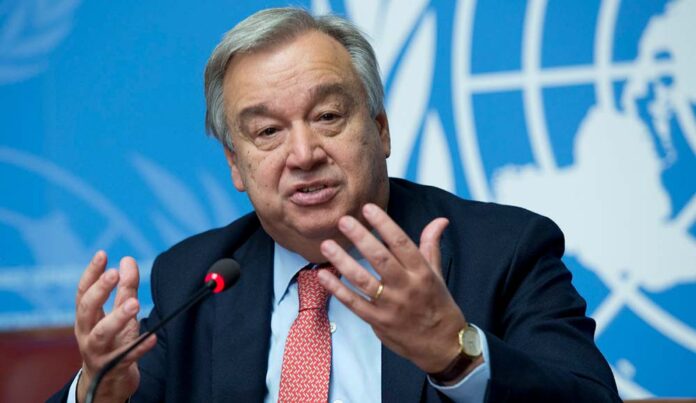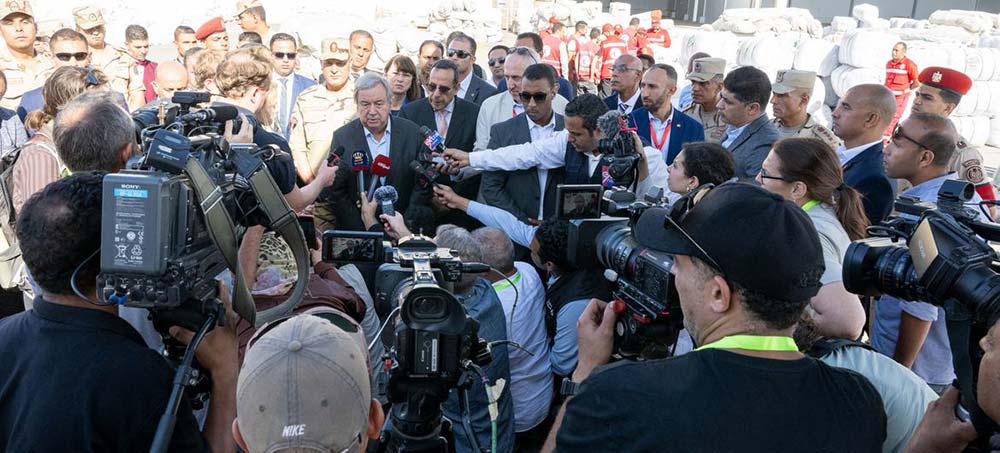In an unprecedented move, United Nations Secretary-General António Guterres has addressed media personnel at the very site where a humanitarian situation is rapidly evolving.
Speaking to media at the Rafah-crossing in Egypt on Friday,20 October, the UN Chief drew attention of the world to the paradox of hope and despair for a besieged community being separated by a border wall, strategic interests, and bureaucratic hurdles.
Secretary-General Guterres stated: “It is impossible to be here and not to feel a broken heart. We are witnessing a paradox. Behind these walls, we have two million people who are suffering enormously — who have no water, no food, no medicine, no fuel; who are under fire, and need everything to survive.
“On this side, we have seen so many trucks loaded with water, with fuel, with medicines, with food. Exactly the same things that are needed on the other side of the wall. So these trucks are not just trucks. They are a lifeline. They are the difference between life and death for so many people in Gaza. And to see them stuck here makes me be very clear.
What we need is to make them move, to make them move to the other side of this wall, to make them move as quickly as possible and as many as possible. “Now, recently it was announced by Israel and by the United States that humanitarian aid will be allowed to enter Gaza. And I know that there is also an agreement between Egypt and Israel to make it possible.
“But these announcements were made with some conditions and some restrictions. And so we are now actively engaging with all the parties, actively engaging with Egypt, with Israel, with the US, in order to make sure that we are able to clarify those conditions, that we are able to limit those restrictions in order to have as soon as possible these trucks moving to where they are needed.”
He added, “We are looking for convoys to be authorized, with meaningful numbers of trucks to go everywhere into Gaza to provide enough support to the Gaza people. However, there are requirements of verification. But those verifications need to be effective, and at the same time, those verifications need to be done in a way that is practical and in a way that is expedited.
“On the other hand, we are not in a no-man’s land. We are in the land of a sovereign country, Egypt. And it is essential to recognize the role of the Egyptian institutions and namely of the Egyptian Red Crescent. And finally, for the UN Relief and Work Agency (UNRWA), to be able to distribute aid on that side, it is necessary that UNRWA has fuel and so we need to have the guarantee that we have enough fuel on the other side to distribute aid to the people in need.
“So, it is very clear that it is absolutely essential to solve these problems quickly and I am hopeful they will be solved quickly to make sure there is massive support, humanitarian support, to the people of Gaza.
“Unfortunately, this is not a normal humanitarian operation. It is an operation in a war zone and that is the reason why I have appealed for a humanitarian ceasefire, not that I consider that a humanitarian ceasefire is a precondition for humanitarian delivery. We don’t want to punish the Gaza people twice. First because of the war and second because of the lack of humanitarian aid. But it is clear that a humanitarian ceasefire will make things much easier and much safer for everybody.
“ And I want to end by expressing my deep gratitude to the people and the Government of Egypt. Egypt is today the fundamental pillar that allows hope to exist on that side of the border. Hope that these trucks will move to support them. Hope that the food, aid and the medicines I have seen in a plane that has landed will also go to the people that need it. Hope that there will be a future and hope that one day there will be peace with a two-State solution, with Palestinians and Israelis living in peace in two States, one side by the other.”


















